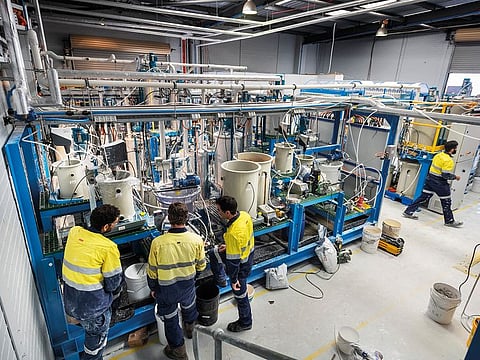Lepidico helps build foundations for a clean future
Australian firm helps build towards an electric vehicle battery supply chain in region

In 2018, when Lepidico, a lithium-mica processing company, was scouting for a location to set up its first chemical plant, Abu Dhabi seemed a good fit. The UAE capital has an abundant supply of sulphur, which is one of the key raw materials needed for Lepidico’s chemical plant. But besides this, what attracted the Australian company to UAE shores was the affordable supply of energy, with growing non-greenhouse gas emitting components, a conducive business environment, and the vision for net zero emissions in the next three decades.
Lepidico shares the UAE’s ambition for a clean future and aspires to support the country in achieving net zero emissions by 2050. It sees its first lithium chemical plant as being an enabler for development of downstream components of the broader electric vehicle battery supply chain and propel greater adoption of green vehicles on the road.
“I think there’s an enormous opportunity for the UAE. Lithium is a critical key component for electric vehicle manufacture. It’s essential for lithium-ion batteries. By bringing lithium chemical production to the UAE, we should enable downstream manufacturers of cathodes and then batteries to come to the UAE,” says Joe Walsh, Managing Director, Lepidico.
Lepidico is building a 57,000-square-metre zero waste facility in KEZAD, Abu Dhabi. So far, the company has completed the front end, engineering and design for the chemical plant, and over the next few months it plans to start the second stage. The whole facility is expected to be up and running in about two years with production commencing around mid-2025.
Once operational, the chemical plant will produce around 5,000 tonnes of lithium hydroxide and five other products every year. “Lepidico employs a number of proprietary process technologies to process lithium mica minerals, which collectively present a less conventional source of lithium chemicals. The primary mining and concentration of lithium mica will be in Namibia, which is where we are building the upstream part of our business. The lithium mica concentrate will then be exported to Abu Dhabi and be processed into lithium hydroxide and five other products, including caesium and rubidium.”
What differentiates this plant is the technology. Lepidico has invested in developing process technologies that are less energy intensive compared with conventional ways of producing lithium hydroxide from the mineral spodumene. The company has run multiple pilot plants in Perth, Western Australia. The adoption of the technology in KEZAD will make it the world’s first commercial scale plant.
“We are arguably the most advanced company in the world with hydrometallurgical solutions for treating lithium mica minerals. Conventional processing for lithium involves a very energy-intensive roasting process at around 1,200 degrees Celsius that emits a significant amount of greenhouse gas. Our process operates at a maximum temperature of just 120 degrees Celsius. Furthermore, two-thirds of our greenhouse gas emissions are in the natural gas that we use to produce steam for the process,” notes Walsh.
The company is already mulling using green hydrogen instead of natural gas to lower emissions further. “There are significant initiatives to bring commercial quantities of green hydrogen to KEZAD before 2030. The move should allow us to lower our greenhouse gas emissions dramatically and thereby produce some of the world’s lowest emission lithium chemicals. We see our 21st century technologies as supporting the challenge of meeting net zero emissions by 2050.”
Once the plant is fully operational, Lepidico will also bring a new source of caesium and rubidium to the world market. “These two metals are on the US government’s list of 50 critical minerals. The availability of these chemical compounds in the UAE could result in furthering the development of technologies in the UAE in the application of those metals,” says Walsh.
Some of the by-products from this chemical plant will also help the UAE’s construction and agriculture industry in lowering carbon emissions. “One of the products, for instance, is a reactive silica, which can be used to partially reduce the use of cement in concrete to reduce its greenhouse gas footprint. We will also produce sulphate of potash, which is a fertiliser. At the moment, the UAE relies 100 per cent on imports to meet the needs of the agriculture sector.”
Lepidico is conscious of its role and impact on the environment. “Leading environmental, social, and corporate governance credentials are vital in any new industrial development and Lepidico absolutely delivers in this regard. This first project in Abu Dhabi will demonstrate the commercial viability of our technologies, which in turn should allow us to develop a global market for lithium mica minerals and thereby enable further development within the UAE and elsewhere in the world. We have a sustainable growth business model: upstream in Namibia, midstream in the UAE and around the world with best practice social and environmental characteristics” says Walsh.
The Australian firm has invested $50 million in developing the technology. The company has earmarked $200 million for investment in Abu Dhabi, and around $65 million in Namibia.



